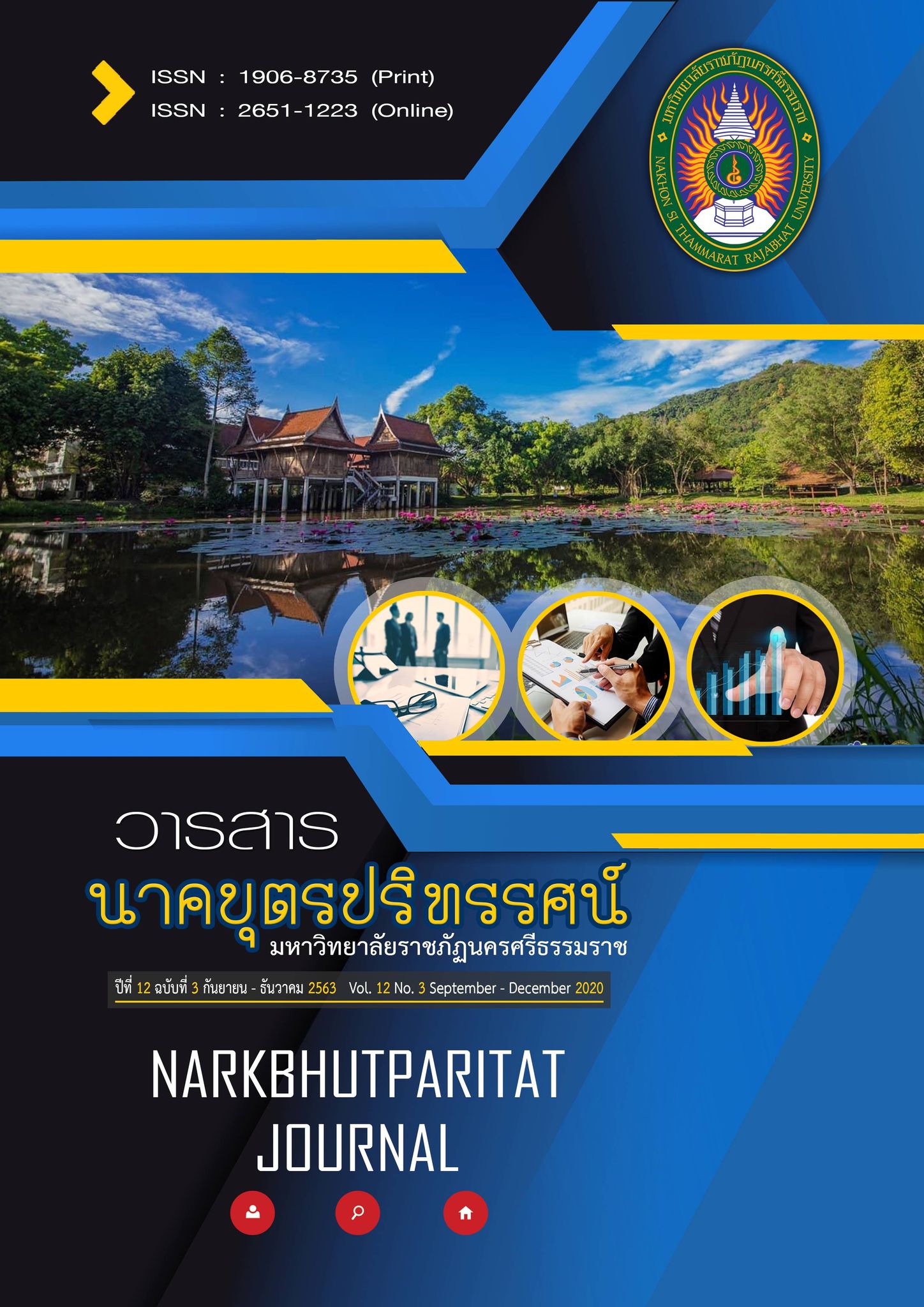แบบภาวะผู้นำของผู้บริหารสถานศึกษาที่ส่งผลต่อกระบวนการนิเทศภายในสถานศึกษา สังกัดสำนักงานเขตพื้นที่การศึกษามัธยมศึกษา เขต 11 จังหวัดสุราษฎร์ธานี
Main Article Content
บทคัดย่อ
การศึกษาในครั้งนี้มีวัตถุประสงค์ 1) เพื่อศึกษาแบบภาวะผู้นำของผู้บริหารสถานศึกษา สังกัดสำนักงานเขตพื้นที่การศึกษามัธยมศึกษา เขต 11 จังหวัดสุราษฎร์ธานี 2) เพื่อศึกษากระบวนการนิเทศภายในสถานศึกษา สังกัดสำนักงานเขตพื้นที่การศึกษามัธยมศึกษา เขต 11 จังหวัดสุราษฎร์ธานี และ 3) เพื่อศึกษาแบบภาวะผู้นำของผู้บริหารสถานศึกษาที่ส่งผลต่อกระบวนการนิเทศภายในสถานศึกษา สังกัดสำนักงานเขตพื้นที่การศึกษามัธยมศึกษา เขต 11 จังหวัดสุราษฎร์ธานี ประชากรประชากรที่ใชในการวิจัยครั้งนี้ ไดแก ผูบริหารและครูผู้สอนในสังกัด สํานักงานเขตพื้นที่การศึกษามัธยมศึกษา เขต 11 ปการศึกษา 2560 จํานวน 66 โรงเรียน ประชากร ทั้งหมดจํานวน 3,178 คน ซึ่งมีขนาดกลุมตัวอยางตามวิธีของ Yamane ไดกลุมตัวอยางจํานวน 355 คน เครื่องมือที่ใช้ในการวิจัย ได้แก่ แบบสอบถามมี 3 ตอน ดังนี้ ตอนที่ 1 ขอมูลทั่วไปของผูตอบแบบสอบถาม ตอนที่ 2 เปนแบบสอบถามเกี่ยวกับระดับการปฏิบัติของผูบริหารสถานศึกษาและครูตามแบบภาวะผูนําของ ผูบริหารสถานศึกษาที่สงผลตอกระบวนการนิเทศภายในสถานศึกษา สังกัดสํานักงานเขตพื้นที่การศึกษามัธยมศึกษา เขต 11 จังหวัดสุราษฎรธานี ประกอบดวย ภาวะผูนําแบบสั่งการ ภาวะผูนําแบบใหการสนับสนุน ภาวะผูนําแบบมีสวนรวม และภาวะผูนําแบบมุงความสําเร็จของงาน โดยมีระดับการปฏิบัติ 5 ระดับ ตอนที่ 3 เปนแบบสอบถามเกี่ยวกับระดับการปฏิบัติตามกระบวนการนิเทศภายในสถานศึกษา สังกัดสํานักงานเขตพื้นที่การศึกษามัธยมศึกษาเขต 11 จังหวัดสุราษฎรธานี ประกอบดวย การสํารวจความตองการและความจําเปน การวางแผนการนิเทศ การใหความรูกอนดําเนินการนิเทศ โดยมีระดับการปฏิบัติ 5 ระดับ สถิติที่ใช้ในการวิเคราะห์ข้อมูล ได้แก่ ความถี่ รอยละ สวนเบี่ยงเบนมาตรฐาน และการวิเคราะหการถดถอยพหุคูณแบบขั้นตอน
ผลการศึกษาพบว่า 1) แบบภาวะผู้นำของผู้บริหารสถานศึกษา สังกัดสำนักงานเขตพื้นที่การศึกษามัธยมศึกษา เขต 11 โดยรวมอยู่ในระดับมาก และรายด้านอยู่ในระดับมาก และปานกลาง เมื่อพิจารณาเป็นรายด้าน เรียงจากมากไปน้อย คือ ด้านภาวะผู้นำแบบมุ่งความสำเร็จ ด้านภาวะผู้นำแบบสั่งการ ด้านภาวะผู้นำแบบให้การสนับสนุน และด้านภาวะผู้นำแบบมีส่วนร่วม 2) กระบวนการนิเทศภายในสถานศึกษา สังกัดสำนักงานเขตพื้นที่การศึกษามัธยมศึกษาเขต 11 โดยรวมอยู่ในระดับมาก และรายด้านอยู่ในระดับมาก เมื่อพิจารณาเป็นรายด้าน เรียงจากมากไปน้อย คือ ด้านการปฏิบัติการนิเทศ ด้านการให้ความรู้ก่อนดำเนินการนิเทศ ด้านการสร้างเสริมกำลังใจแก่ผู้ปฏิบัติงานนิเทศ ด้านการวางแผนการนิเทศ ด้านการสำรวจความต้องการและความจำเป็น และด้านการประเมินผลการนิเทศและการรายงานผล 3) แบบภาวะผู้นำของผู้บริหารสถานศึกษาที่ส่งผลต่อกระบวนการนิเทศภายในสถานศึกษา สังกัดสำนักงานเขตพื้นที่การศึกษามัธยมศึกษา เขต 11 แบบภาวะผู้นำของผู้บริหารสถานศึกษา สามารถทำนายระดับการปฏิบัติตามกระบวนการนิเทศภายในสถานศึกษา สังกัดสำนักงานเขตพื้นที่การศึกษามัธยมศึกษา เขต 11 ภาพรวม อย่างมีนัยสำคัญทางสถิติที่ระดับ .05 โดยมีประสิทธิภาพในการทำนายได้ ร้อยละ 59.5 ได้แก่ ด้านภาวะผู้นำแบบสั่งการ ด้านภาวะผู้นำแบบให้การสนับสนุน ภาวะผู้นำแบบมีส่วนร่วม และภาวะผู้นำแบบมุ่งความสำเร็จ ตามลำดับ
Article Details
เอกสารอ้างอิง
Bhaopichitr, K. (2012). THAILAND ECONOMIC MONITOR DECEMBER 2012. Bangkok : World
Bank Office – Bangkok.
Fry, Gerald W., and Bi, H. (2013). The evolution of educational reform in Thailand: the
Thai educational paradox, Journal of Educational Administration, Vol. 51 No.3,
– 319.
Innara, S. (2015). The leadership of School Administrators affecting on the effectiveness of Academic Administration in school under the Department of Education Bangkok Metropolitan Administration.(Master of Education Thesis). King Mongkut’s Institute Of Technology Ladkrabang, Faculty of Education, Program in Educational Administration. (in Thai)
Nandilok, J. (2013). School leadership administrators Affecting Teacher Effectiveness under the Office of Kalasin Primary Educational Service Area 1.(Master of Education Thesis). Khon Kaen University, Faculty of Education, Program in Educational Administration. (in Thai)
Office of the National Education Commission. (2010). Guidelines for the implementation
of education reform policy Into action. Bangkok. (in Thai)
Office of the National Economic and Social Development Council. (2012). The eleventh
national economic and social development plan issue 12 2017 – 2021.
Bangkok: Office of the prime minister. (in Thai)
Office of the Education Council. (2016). Competencies in Thai education on the international
stage 2015. (IMD 2016). Bangkok : The Phrikhwan graphic Group Management. (in Thai)
Office of the Education Council. (2017). The education plan 2017 – 2036. Bangkok : The
Phrikhwan graphic Group Management. (in Thai)
Sirorattanyachok, W. (2016). School administrators’ leadership affecting educational
personnel development of government primary schools in Ratchaburi Province.
(Master of Education Thesis). Nakhon Pathom: Nakhon Pathom Rajabhat University, Faculty of Education, Program in Educational Administration. (in Thai)
The Suratthani Secondary Educational Service Area Office 11. (2017). Performance report of
fiscal year 2017. Suratthani. (in Thai)
Torasri, C. (2104). Leadership Styles of School Administrators Affecting Teaching Efficiency of Teachers under Chachoengsao Primary Education Service Area Office 2. (Master of Education Thesis). Sukhothai Thammathirat Open University, Faculty of Education, Program in Educational Administration. (in Thai)
Yotrungruang, P. (2015). Guidelines to Develop Leadership of School Administrators Under Petcahbun Primary Educational Service Area Office 3. (Master of Education Thesis). Nakhon Sawan Rajabhat University, Faculty of Education, Program in Educational Administration. (In Thai)


